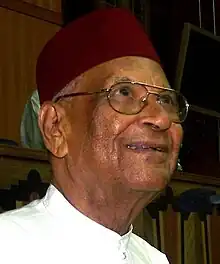Amadou-Mahtar M'Bow
Amadou-Mahtar M'Bow, GCIH (born 20 March 1921)[1][2] is a Senegalese retired civil servant and former Director-General of UNESCO. Born in Dakar, M'bow served in France and North Africa during World War II after volunteering for the French Army, also serving with the Free French, and finally in the French Air Force.[3] After the end of the war, he studied geography at the Sorbonne University in Paris. He served at UNESCO Headquarters in Paris from 1953 to 1987.
Amadou-Mahtar M'Bow | |
|---|---|
 | |
| Director-General UNESCO | |
| In office 1974–1987 | |
| Personal details | |
| Born | 20 March 1921 Dakar, French West Africa (now Senegal) |
| Education | Sorbonne University |
| Occupation | politician, diplomat, educator |
Biography
M'Bow began working for UNESCO in 1953 and served as its Director-General from 1974 to 1987, being the first black African to head a United Nations organisation. His tenure has been described as marked by an alternative framework for the production of knowledge and information, moving away from Eurocentric tendencies and encouraging the diversity of experiences and cultures.[4] He was President of the PanAfrican Archaeological Association from 1967 to 1971.[5]
In 1978, he made the speech "A plea for the return of an irreplaceable cultural heritage to those who created it", where he called for the restitution of cultural heritage from the northern to the southern hemisphere.[6] His call followed the 1973 resolution no. 3187 about the Restitution of works of art to countries victims of expropriation,[7] but had no decisive effect on restitutions.
In May 1980, M'Bow called the Commission over the Problems of Communication which delivered the MacBride Report (so called after its president, Seán MacBride), supporting international claims for a New World Information and Communication Order. His departure in 1987 followed criticism for administrative and budgetary practices and the US withdrawal from UNESCO in 1984 (followed by the UK in 1985).
In 1980, M'Bow was awarded an honorary doctorate from the University of Belgrade. In february 1981, he was awarded an honorary doctorate from the Rijksuniversiteit Gent (Ghent University). He retired to his home country of Senegal in 1987 and celebrated his 100th birthday in March 2021.[8]

Honours
 Grand-Cross of the Order of Prince Henry, Portugal (6 April 2017)[9]
Grand-Cross of the Order of Prince Henry, Portugal (6 April 2017)[9]
References
- El Hareir, Idris (2011). The Spread of Islam Throughout the World. UNESCO. p. 906. ISBN 978-9231041532.
- Profile of Amadou-Mahtar M'Bow
- Meisler, Stanley (2011). United Nations: A History. Grove Press. ISBN 9780802194992. Retrieved 19 December 2017.
- Davies, Carole Elizabeth Boyce (2008). Encyclopedia of the African Diaspora: Origins, Experiences, and Culture. Santa Barbara, California: ABC-CLIO. p. 666. ISBN 978-1-85109-705-0.
- "Congresses and Presidents – PanAfrican Archaeological Association". www.panafprehistory.org. Retrieved 2021-10-22.
- Speech held in Paris on 7 June 1978, available on the UNESCO website. See Amadou-Mahtar M'Bow, "Pour le retour, a ceux qui l'ont crée, d’un patrimoine culturel irremplaçable", Museum, vol. 31, no. 1, 1979, p. 58.
- United Nations (December 1973). "Resolution 3187" (pdf). undocs.org. Archived from the original on 2021-10-18. Retrieved 2021-10-18.
- "Amadou Mahtar Mbow fête ses 100 ans" (in French). Rewmi. 20 March 2021. Retrieved 20 March 2021.
- "Cidadãos Nacionais Agraciados com Ordens Portuguesas". Página Oficial das Ordens Honoríficas Portuguesas. Retrieved 31 July 2017.